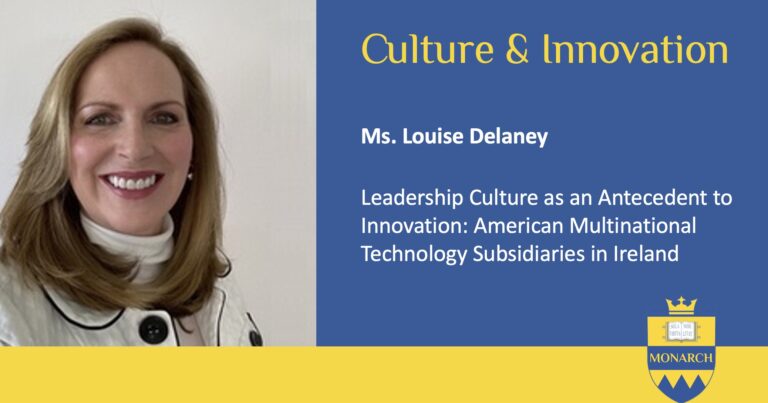Monarch is happy to announce the recent authorized research plan addressing the factors behind innovation within subsidiaries of American technology companies in Ireland by Doctoral Candidate Ms. Louise Delaney.
The Research
Ireland is an innovation leader according to the Global Innovation Index, and is rated in the top ten consistently across all performance indicators since the report’s inception in 2007 (Dutta et al., 2020). Ireland’s economy is highly globalized (Brennan, 2022). According to the Irish Central Statistics Office, foreign direct investment comprises 288% of Ireland’s GDP[1] (Brennan, 2022). In 2019, Ireland exceeded an unprecedented one trillion dollars of FDI. Despite the global COVID-19 pandemic, FDI into Ireland rose incrementally by 71 billion euros in 2020, with the technology sector showing particular resilience (Brennan, 2022). The year 2021 continued to see FDI inflows. According to the Industrial Development Authority (IDA), Ireland remains an attractive location for multinational subsidiary operations despite raising its corporate tax rate from 12.5% to 15% in 2021 (Mehboob, 2021). Ireland made this adjustment to align with the minimum European corporate tax rate proposed by the OECD as part of their inclusion framework (Brazys & Regan, 2021; Rootsma, 2021). Ireland’s innovation capacity is cited as a critical strategic pillar attracting multinational investment (Siedschlag et al., 2021). The United States is the largest investor in Ireland accounting for almost three-quarters of total FDI. Ireland’s overall innovation profile is healthy. However, studies concerning the understanding of contributing factors for this success appear limited.
[1] FDI is not automatically included in GDP. It is included only when money is spent to create economic activity to form physical capital.
A supportive culture that fosters innovation is referred to in the academic literature as an “innovation supportive culture”. Studies to date highlight the central role of leadership in mediating a supportive culture that fosters innovation (Bhutto et al., 2018; Denti & Hemlin, 2012; Soken & Barnes, 2014; Von Stamm, 2009). The contemplated research will explore the impact of the leadership dimensions of trust, power and communication on innovation supportive culture in subsidiaries of US multinational technology companies in Ireland. The research will seek to understand the leadership dimensions between Irish subsidiary leadership and US Headquarter leadership to unpack the effect these dimensions have on levels of subsidiary innovation. The research endeavors to contribute to the innovation literature by responding to the call for a multidimensional exploration of organizational culture (Dobni, 2008) and the multinational subsidiary literature by providing a greater appreciation of the role of innovation supportive culture (Birkenshaw & Hood, 1998). Given Ireland’s economic dependence on multinational investment and its overall innovation success, coupled with the scholarship pointing to leadership as a central mediator of innovation supportive culture, the research may be perceived as a valuable proposition of interest to the IDA, their multinational clients and subsidiary management in Ireland.
The Researcher
 Ms. Louise Delaney is a Doctor of Applied Leadership & Coaching Candidate. She holds a Master’s Degree in Innovation & Technology Management from the Dublin Institute of Technology. She also holds a Bachelor’s Degree in Business Studies from the Dundalk Institute of Technology, Ireland where she also earned a Post-graduate Diploma in Management & Technology. In addition, Louise has a Diploma in Social Studies.
Ms. Louise Delaney is a Doctor of Applied Leadership & Coaching Candidate. She holds a Master’s Degree in Innovation & Technology Management from the Dublin Institute of Technology. She also holds a Bachelor’s Degree in Business Studies from the Dundalk Institute of Technology, Ireland where she also earned a Post-graduate Diploma in Management & Technology. In addition, Louise has a Diploma in Social Studies.
Professionally, she has held various leadership positions in the technology sector in Ireland, spanning a career of over 20 years and is highly specialised in growing, developing and leading high-performance teams. Louise is curious about all aspects of women’s leadership and is keenly interested in the emerging field of spiritual intelligence and its potential role in women’s leadership development.

